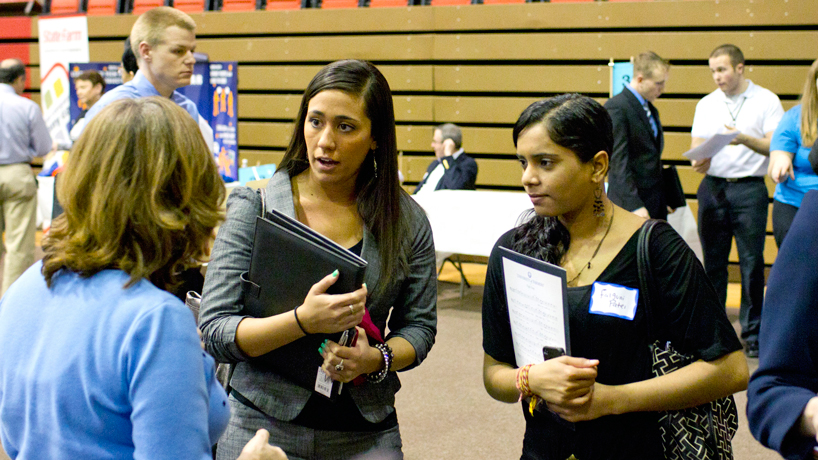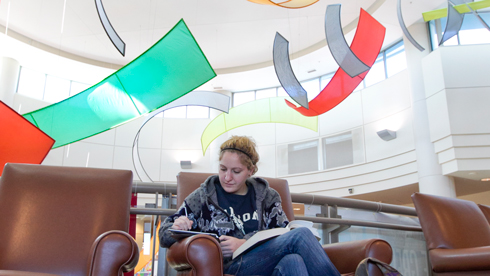New college graduates will face an overwhelming number of financial choices, according to a new study by Gregory Geisler, associate professor of accounting at UMSL.


New college graduates will face an overwhelming number of financial choices, according to a new study by Gregory Geisler, associate professor of accounting at UMSL.
New college graduates will face an overwhelming number of financial choices, according to a new study by Gregory Geisler, associate professor of accounting at UMSL.
New college graduates will face an overwhelming number of financial choices, according to a new study by Gregory Geisler, associate professor of accounting at UMSL.
The university also scored highly among online bachelor’s programs for veterans and was No. 33 nationally in the Best Online MBA rankings.

A multi-year study recently completed by researchers in the Center for Business and Industrial Studies at the University of Missouri–St. Louis found that credit bureau data are sufficiently accurate to support institutions in issuing and managing credit, but a small percentage of individual consumers can be harmed significantly by errors in their files. The $1.13 million study, commissioned by the U.S. Federal Trade Commission, to record the accuracy of information maintained by the major U.S. credit reporting agencies, was conducted by L. Douglas Smith, director of the Center for Business and Industrial Studies and professor of management science at UMSL; Thomas Eyssell, associate dean and director of the College of Business Administration’s registered Financial Planning program; Maureen Karig, senior research associate with the Center for Business and Industrial Studies at UMSL; Mike Staten, professor at University of Arizona in Tucson; graduate researchers at UMSL and UA, and professionals and senior economists at Fair Isaac Corporation.
A multi-year study recently completed by researchers in the Center for Business and Industrial Studies at the University of Missouri–St. Louis found that credit bureau data are sufficiently accurate to support institutions in issuing and managing credit, but a small percentage of individual consumers can be harmed significantly by errors in their files. The $1.13 million study, commissioned by the U.S. Federal Trade Commission, to record the accuracy of information maintained by the major U.S. credit reporting agencies, was conducted by L. Douglas Smith, director of the Center for Business and Industrial Studies and professor of management science at UMSL; Thomas Eyssell, associate dean and director of the College of Business Administration’s registered Financial Planning program; Maureen Karig, senior research associate with the Center for Business and Industrial Studies at UMSL; Mike Staten, professor at University of Arizona in Tucson; graduate researchers at UMSL and UA, and professionals and senior economists at Fair Isaac Corporation.
A multi-year study recently completed by researchers in the Center for Business and Industrial Studies at the University of Missouri–St. Louis found that credit bureau data are sufficiently accurate to support institutions in issuing and managing credit, but a small percentage of individual consumers can be harmed significantly by errors in their files. The $1.13 million study, commissioned by the U.S. Federal Trade Commission, to record the accuracy of information maintained by the major U.S. credit reporting agencies, was conducted by L. Douglas Smith, director of the Center for Business and Industrial Studies and professor of management science at UMSL; Thomas Eyssell, associate dean and director of the College of Business Administration’s registered Financial Planning program; Maureen Karig, senior research associate with the Center for Business and Industrial Studies at UMSL; Mike Staten, professor at University of Arizona in Tucson; graduate researchers at UMSL and UA, and professionals and senior economists at Fair Isaac Corporation.

Claire Boylan, a senior majoring in history at the University of Missouri–St. Louis, makes notes while reading the book “Lion of the Valley: St. Louis, Missouri, 1764-1980.” The assigned reading was part of History of St. Louis, a course offered through the university’s Winter Intersession program. Boylan, of O’Fallon, Mo., was studying Jan. 8 in the second floor rotunda at the Millennium Student Center.
Claire Boylan, a senior majoring in history at the University of Missouri–St. Louis, makes notes while reading the book “Lion of the Valley: St. Louis, Missouri, 1764-1980.” The assigned reading was part of History of St. Louis, a course offered through the university’s Winter Intersession program. Boylan, of O’Fallon, Mo., was studying Jan. 8 in the second floor rotunda at the Millennium Student Center.
Claire Boylan, a senior majoring in history at the University of Missouri–St. Louis, makes notes while reading the book “Lion of the Valley: St. Louis, Missouri, 1764-1980.” The assigned reading was part of History of St. Louis, a course offered through the university’s Winter Intersession program. Boylan, of O’Fallon, Mo., was studying Jan. 8 in the second floor rotunda at the Millennium Student Center.